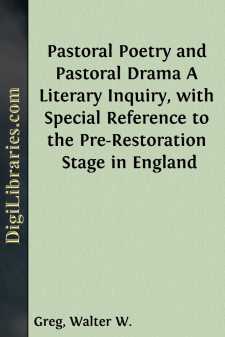Categories
- Antiques & Collectibles 13
- Architecture 36
- Art 48
- Bibles 22
- Biography & Autobiography 813
- Body, Mind & Spirit 142
- Business & Economics 28
- Children's Books 15
- Children's Fiction 12
- Computers 4
- Cooking 94
- Crafts & Hobbies 4
- Drama 346
- Education 46
- Family & Relationships 57
- Fiction 11828
- Games 19
- Gardening 17
- Health & Fitness 34
- History 1377
- House & Home 1
- Humor 147
- Juvenile Fiction 1873
- Juvenile Nonfiction 202
- Language Arts & Disciplines 88
- Law 16
- Literary Collections 686
- Literary Criticism 179
- Mathematics 13
- Medical 41
- Music 40
- Nature 179
- Non-Classifiable 1768
- Performing Arts 7
- Periodicals 1453
- Philosophy 64
- Photography 2
- Poetry 896
- Political Science 203
- Psychology 42
- Reference 154
- Religion 513
- Science 126
- Self-Help 84
- Social Science 81
- Sports & Recreation 34
- Study Aids 3
- Technology & Engineering 59
- Transportation 23
- Travel 463
- True Crime 29
Pastoral Poetry and Pastoral Drama A Literary Inquiry, with Special Reference to the Pre-Restoration Stage in England
by: Walter W. Greg
Description:
Excerpt
Chapter I.
Foreign Pastoral Poetry
In approaching a subject of literary inquiry we are often able to fix upon some essential feature or condition which may serve as an Ariadne's thread through the maze of historical and aesthetic development, or to distinguish some cardinal point affording a fixed centre from which to survey or in reference to which to order and dispose the phenomena that present themselves to us. It is the disadvantage of such an artificial form of literature as that which bears the name of pastoral that no such a priori guidance is available. To lay down at starting that the essential quality of pastoral is the realistic or at least recognizably 'natural' presentation of actual shepherd life would be to rule out of court nine tenths of the work that comes traditionally under that head. Yet the great majority of critics, though they would not, of course, subscribe to the above definition, have yet constantly betrayed an inclination to censure individual works for not conforming to some such arbitrary canon. It is characteristic of the artificiality of pastoral as a literary form that the impulse which gave the first creative touch at seeding loses itself later and finds no place among the forces at work at blossom time; the methods adopted by the greatest masters of the form are inconsistent with the motives that impelled them to its use, and where these motives were followed to their logical conclusion, the resuit, both in literature and in life, became a byword for absurd unreality. To live at all the ideal appeared to require an atmosphere of paradox and incongruity: in its essence the most 'natural' of all poetic forms, pastoralism came to its fairest flower amid the artificiality of a decadent court or as the plaything of the leisure hours of a college of learning, and its insipid convention having become 'a literary plague in every European capital,' it finally disappeared from view amid the fopperies of the Roman Arcadia and the puerile conceits of the Petit Trianon.
Wherein then, it may be wondered, does the pastoral's title to consideration lie. It does not lie primarily, or chiefly, in the fact that it is associated with names of the first rank in literature, with Theocritus and Vergil, with Petrarch, Politian, and Tasso, with Cervantes and Lope de Vega, with Ronsard and Marot, with Spenser, Ben Jonson, and Milton; nor yet that works such as the Idyls, the Aminta, the Faithful Shepherdess, and Lycidas contain some of the most graceful and perfect verse to be found in any language. Rather is its importance to be sought in the fact that the form is the expression of instincts and impulses deep-rooted in the nature of humanity, which, while affecting the whole course of literature, at times evince themselves most clearly and articulately here; that it plays a distinct and distinctive part in the history of human thought and the history of artistic expression. Moreover, it may be argued that, from this point of view, the very contradictions and inconsistencies to which I have alluded make it all the more important to discover wherein lay the strange vitality of the form and its power of influencing the current of European letters....


